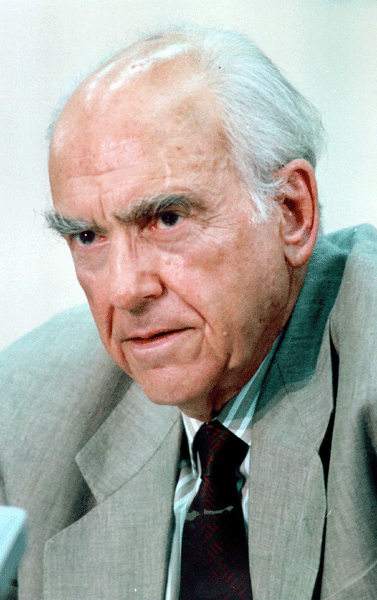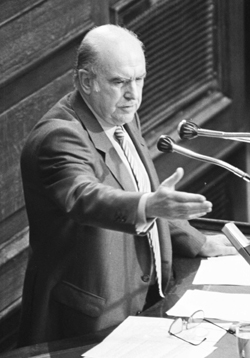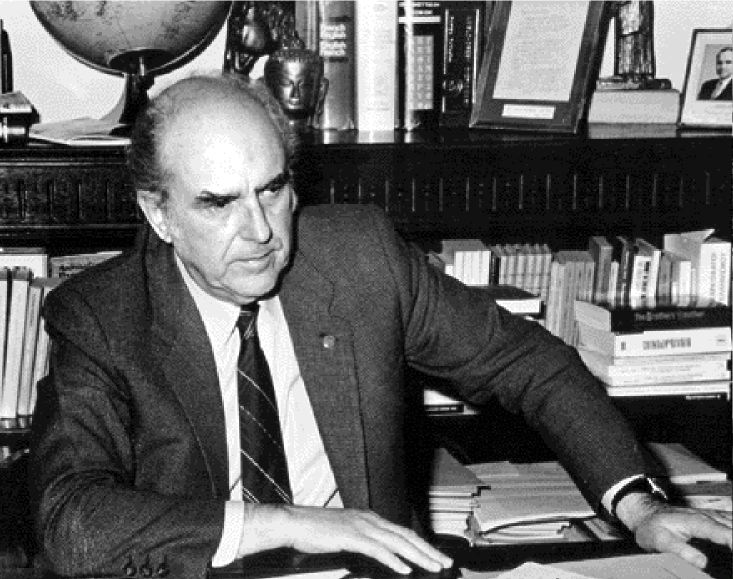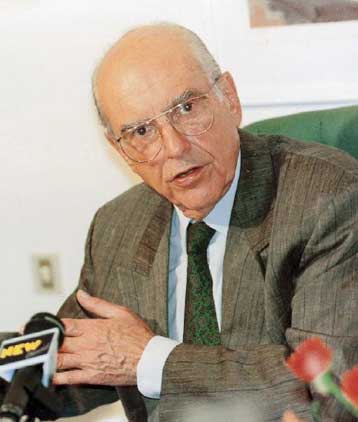<Back to Index>
- Prime Minister of Greece Ioannis Paraskevopoulos (Ιωάννης Παρασκευόπουλος), 1900
- Prime Minister of Greece Andreas Papandreou (Ανδρέας Παπανδρέου), 1919
PAGE SPONSOR
Ioannis Polychroniou Paraskevopoulos was a Greek banker and politician, who was twice Prime Minister of Greece and held various ministerial portfolia.
He was born in 1900 at Ladba (Λάβδα), present day Theisoa (Θεισόα) in Olympia. After finishing his studies at the University of Athens, he continued studying Law and Economics at the University of Munich, Jenna, Leipzig and London. He was an employee of the Deutsche Bank (1925) and of Midland Bank (1927 - 1929). He earned a Doctoral Degree from the Universities at Leipzig and London. In 1936, he was appointed Lecturer of Political Economy at the University of Athens and in 1938 a Professor at the School of Economics and Business Sciences (ΑΣΟΕΕ) in Athens. In 1939 he was appointed Assistant professor and in 1942 Professor of the Panteion University in Athens.
In 1931, he was employed by the National Bank of Greece as Director of Business Planning and Financing. Then, he assumed direction of the Directorate of Industrial Credit up until 1954, when he was elected to the post of the Vice Governor of the Bank. In parallel, he was president, member and director of various scientific organizations, Public Service Companies, Consulting Boards and Charity Foundations, including also a stint as Vice President of the International Bank of Reconstruction and Development.
He was repeatedly a member of caretaker Governments as Minister of Supplies and National Economy (the Petros Voulgaris Ministry of April 1945, the Petros Voulgaris Ministry of August 1945), Minister of Commerce, Industry and Labor (1952) and Minister of Industry and Commerce in March 1958 (Caretaker Ministry of Konstantinos Georgakopoulos). In December 30, 1963, while Vice - Governor of the National Bank of Greece, he was chosen by King Constantine II as Prime Minister of the Caretaker Government with a mandate to lead the Country into new elections. He remained at this post until the elections of February 16, 1964.
On December 22, 1966, King Constantine II, after consulting Georgios Papandreou and Panayotis Kanellopoulos, he again appointed Ioannis Paraskevopoulos as Caretaker Prime Minister with a mandate to proclaim new elections. However, his last Government collapsed on April 3, 1967, losing the confidence of the Hellenic Parliament, and the King assigned a new Government Forming Mandate to Panayotis Kanellopoulos. After 1967, Ioannis Paraskevopoulos withdrew from Public Life.
He was the author of several academic publications, mainly in the field of Public Financing and Economic Administration that proved influential.
He died on April 8, 1984.



Andreas G. Papandreou (Greek: Ανδρέας Γ. Παπανδρέου); 5 February 1919 – 23 June 1996) was a Greek economist, a socialist politician and a dominant figure in Greek politics. The son of Georgios Papandreou, Andreas was a Harvard trained academic. He served two terms as Prime Minister of Greece (21 October 1981, to 2 July 1989, and 13 October 1993, to 22 January 1996).
His assumption of power in 1981
influenced the course of Greek political history, ending an almost
50 year long system of power dominated by conservative forces; the
achievements of his successive governments include the official
recognition of the Greek Resistance against the Axis, the establishment
of the National Health System and the Supreme Council for Personnel
Selection (ASEP),
the passage of Law 1264/1982 which secured the right to strike and
greatly improved the rights of workers, the constitutional amendment of
1985 – 1986 which strengthened parliamentarism
and reduced the powers of the unelected President, the conduct of an
assertive and independent Greek foreign policy, the expansion in the
power of local governments, many progressive reforms in Greek Law, and granting permission to the refugees of the Greek Civil War to return home in Greece.
The Panhellenic Socialist Movement (PASOK) which he founded and led,
was the first non - communist political
party in Greek history with a mass based organization, and introduced
an unprecedented level of political and social participation in Greek
society. In a poll conducted by Kathimerini in 2007, 48% of those polled
called Papandreou the "most important Greek Prime Minister".
In the same poll, the first four years of Papandreou's government after
Metapolitefsi were voted as the best government Greece ever had.
Papandreou was born on the island of Chios, Greece, the son of the leading Greek liberal politician George Papandreou. His mother, born Zofia (Sofia) Mineyko, was half Polish. Before university, he attended Athens College, a leading private school in Greece. He attended the National and Kapodistrian University of Athens from 1937 till 1938 when, during the Fascist Metaxas dictatorship, he was arrested for purported Trotskyism. Following representations by his father, he was allowed to leave for the US.
In 1943, Papandreou received a PhD in Economics from Harvard University.
Immediately after getting his PhD, Papandreou joined America's war
effort and volunteered for the US Navy, serving as an examiner of models
for repairing warships, and as a hospital corpsman at the Bethesda
Naval Hospital for war wounded
becoming a United States citizen. He returned to Harvard in 1946 and
served as a lecturer and associate professor until 1947. He then held
professorships at the University of Minnesota, Northwestern University,
the University of California, Berkeley, (where he was chair of the
Department of Economics), Stockholm University and York University in
Toronto. In 1948, he entered into a relationship with University of
Minnesota journalism student Margaret Chant.
After Chant obtained a divorce and after his own divorce from Christina
Rasia, his first wife, Papandreou and Chant were married in 1951. They
had three sons and a daughter. Papandreou also had with Swedish actress
and TV presenter Ragna Nyblom a daughter out of wedlock, Emilia Nyblom, who was born in 1969 in Sweden.
Papandreou returned to Greece in 1959, where he headed an economic development research program, by invitation of Prime Minister Konstantinos Karamanlis. In 1960, he was appointed Chairman of the Board of Directors and General Director of the Athens Economic Research Center, and Advisor to the Bank of Greece. In 1963, his father George Papandreou, head of the Center Union, became Prime Minister of Greece. Andreas became his chief economic advisor. He renounced his American citizenship and was elected to the Greek Parliament in the Greek legislative election, 1964. He immediately became Minister to the First Ministry of State (in effect, assistant Prime Minister).
Papandreou took publicly a neutral stand on the Cold War and wished for Greece to be more independent from the United States. He also criticized the massive presence of American military and intelligence in Greece, and sought to remove senior officers with anti - democratic tendencies from the Greek military.
In 1965, while the "Aspida" conspiracy within the Hellenic Army, alleged by the political opposition to involve Andreas personally, was being investigated, George Papandreou moved to fire the defense minister and assume the post himself. King Constantine II of Greece refused to endorse this move and essentially forced George Papandreou's resignation. Greece entered a period of political polarization and instability, which ended with the coup d'état of 21 April 1967.
When the Greek Colonels led by Georgios Papadopoulos seized power in April 1967, Andreas was incarcerated while his father George Papandreou was put under house arrest. George Papandreou, already at advanced age, died in 1968. Under heavy pressure from American academics and intellectuals, such as John Kenneth Galbraith, a friend of Andreas since their Harvard days, the military regime released Andreas on condition that he leave the country. Papandreou then moved to Sweden with his wife, four children, and mother. There he accepted a post at Stockholm University. In Paris, while in exile, Andreas Papandreou formed an anti - dictatorship organization, the Panhellenic Liberation Movement (PAK), and toured the world rallying opposition to the Greek military regime. Despite his former American citizenship and academic career in the United States, Papandreou held the Central Intelligence Agency responsible for the 1967 coup and became increasingly critical of the Federal government of the United States.
In the early 1970s, during the latter phase of the dictatorship in Greece, Papandreou, along with most leading Greek politicians, in exile or in Greece, opposed the process of political normalization attempted by Georgios Papadopoulos and his appointed PM, Spyros Markezinis. On 6 August 1974, Andreas Papandreou called an extraordinary meeting of the National Congress of PAK in Winterthur, Switzerland, which decided its dissolution without announcing it publicly.
Papandreou returned to Greece after the fall of the junta in 1974, during metapolitefsi, and formed a new "radical" party, the Panhellenic Socialist Movement, or PASOK. Most of his former PAK companions, as well as members of other anti - dictatorial groups such as the Democratic Defense joined in the new party. He also testified in the first of the Greek Junta Trials about the alleged involvement of the junta with the Central Intelligence Agency (CIA).
In the Greek legislative election, 1974, PASOK received only 13.5% of the vote, but in 1977 it polled 25%, and Papandreou became Leader of the Opposition. At the Greek legislative election, 1981, PASOK won a landslide victory over the conservative New Democracy Party, and Papandreou became Greece's first socialist Prime Minister.
In office, Papandreou backtracked from much of his campaign rhetoric and followed a more conventional approach. Greece did not withdraw from NATO, United States troops and military bases were not ordered out of Greece, and Greek membership in the European Economic Community continued, largely because Papandreou proved very capable of securing monetary aid for Greece. In domestic affairs, Papandreou's government immediately carried out a massive program of wealth redistribution upon coming into office that immediately increased the prosperity of the common people. Pensions, together with average wages and the minimum wage, were increased in real terms, and changes were made to labor laws which up until 1984 made it difficult for employers to make workers redundant. The impact of the PASOK Government’s social and economic policies was such that it was estimated in 1988 that two - thirds of the decrease in inequality that occurred in Greece between 1974 and 1982 took place between 1981 and 1982.
During its time in office, Papandreou's government carried through sweeping reforms of social policy by introducing a welfare state, significantly expanding welfare measures, expanding health care coverage (the "National Health System" was instituted, which made modern medical procedures available in rural areas for the first time), promoting state - subsidized tourism for lower income families, index - linking pensions, and funding social establishments for the elderly. Rural areas benefited from improved state services, the rights and income of low paid workers were considerably improved, and refugees from the Civil War living in exile from persecution were allowed to return with impunity.
A more progressive taxation scheme was introduced and budgetary support for artistic and cultural programs was increased. The government also introduced a wage indexation system which helped to close the gap modestly between the highest and lowest paid workers, while the share of GNP devoted to social welfare, social insurance, and health was significantly increased.
As part of Papandreou’s "Contract with the People," new liberalizing laws were introduced which decriminalized adultery, abolished (in theory) the dowry system, eased the process for obtaining a divorce, and enhanced the legal status of women. In 1984, for instance, women were guaranteed equal pay for equal work. Papandreou also introduced various reforms in the administration and curriculum of the Greek educational system, allowing students to participate in the election process for their professors and deans in the university, and abolishing tenure.
In a move strongly opposed by the Church of Greece, Papandreou introduced, for the first time in Greece, the process of civil marriage. Prior to the institution of civil marriages in Greece, the only legally recognized marriages were those conducted in the Church of Greece. Couples seeking a civil marriage had to get married outside Greece, generally in Italy. Also, under PASOK, the Greek State also appropriated real estate properties previously owned by the Church.
A major part of Papandreou's allagi (change) involved driving out the "old families" ("tzakia" literally: fireplaces
using the traditional Greek expression for the genealogy of families),
which dominated Greek politics and economy and belonged to the
traditional Greek Right.
Papandreou was comfortably re-elected in the Greek legislative election, 1985 with 46% of the vote, and won still further popularity in March 1987 by his strong leadership during a Greek - Turkish crisis in the Aegean Sea, but from the summer of 1988, his premiership became increasingly clouded by controversy, as the Bank of Crete scandal exploded. In 1989, he divorced his wife Margaret Papandreou and married Dimitra Liani, while in the same year he was indicted by the Hellenic Parliament in connection with a US$ 200 million Bank of Crete embezzlement scandal, and was accused of facilitating the embezzlement by ordering state corporations to transfer their holdings to the Bank of Crete, where the interest was allegedly skimmed off to benefit PASOK, and possibly some of its highest functionaries.
Following the many repercussions of the so-called Koskotas scandal, the Greek legislative election, June 1989 elections produced a deadlock, leading to a prolonged political crisis. In the subsequent Greek legislative election, November 1989 Papandreou's PASOK's won 40% of the popular vote, compared to the rival New Democracy's 46%, and, due to changes made in electoral law one year before the elections by the then reigning PASOK administration, New Democracy was not able to form a government. The Greek legislative election, 1990 followed.
In the wake of three consecutive elections between 1989 and 1990, the New Democracy leader, Constantine Mitsotakis, eventually received sufficient support to form a government. In January 1992, Papandreou himself was cleared of any wrongdoing in the Koskotas scandal after a 7–6 vote in the specially convened High Court trial, ordered by the Hellenic Parliament, with the support of both main parties, New Democracy and PASOK.
Papandreou confounded his critics by winning the Greek legislative election, 1993, and returned to power; however, his fragile health kept him from exercising firm political leadership. He was hospitalized with advanced heart disease and renal failure on 21 November 1995 and finally retired from office on 16 January 1996. He died on 23 June 1996, with his funeral procession producing crowds, ranging from "hundreds of thousands" to "millions" to bid farewell to Andreas. In 1999, Papandreou was posthumously awarded the Swedish Order of the Polar Star.
The expenditure program of the Papandreou government during 1981 – 1990
has been described as excessive by its conservative critics. The
excessive expenditures were not accompanied by corresponding revenue
increases and this led to increases in budget deficits and the public debt.
Many economic indicators worsened during 1981 – 1990 and the economic
policies of his government were condemned as a failure by his critics.
On the other hand, according to his supporters they were very
successful, drastically increasing the purchasing power of the vast
majority of Greeks, with personal incomes growing by 26% in real terms
during the course of the Eighties.
Papandreou's increased spending in his early years in power (1981 – 1985)
was necessary in order to heal the deep wounds of the Greek society, a
society that was still deeply divided by the brutal memories of the
Civil War and the right wing repression that followed;
furthermore, the postwar government philosophy of the Greek
conservatives simply saw the state as a tool of repression, with very
little money spent on health and education, and little interest on the
well being of society.
Papandreou was praised for conducting an independent and multidimensional foreign policy, and proved to be a master of the diplomatic game, thus increasing the importance of Greece in the international system; he was co-creator in 1982 and subsequently an active participant in a movement promoted by the Parliamentarians for Global Action, the Initiative of the Six, which included, besides the Greek PM, Mexico's president Miguel de la Madrid, Argentina's President Raúl Alfonsín, Sweden's PM Olof Palme, Tanzania's president Julius Nyerere and India's Prime Minister Indira Gandhi. The movement's stated objective was the "promotion of peace and progress for all mankind". After various initiatives, mostly directed at pressuring the United States and the Soviet Union to stop nuclear testing and reduce the level of nuclear arms, it eventually disbanded.
Papandreou's rhetoric was at times antagonistic to the United States. He was the first western prime minister to visit General Wojciech Jaruzelski in Poland. According to the Foreign Affairs magazine Papandreou went on record as saying that since the USSR is not a capitalist country "one cannot label it an imperialist power." According to Papandreou, "the Soviet Union represent[ed] a factor that restrict[ed] the expansion of capitalism and its imperialistic aims". This antagonistic stance made him extremely popular, because the previous conservative governments were seen by the Greek people as slavishly loyal to US interests.
Papandreou's government was the first in post war Greece that redirected the nation's defense policy to suit its own security needs, and not those of the United States. From 1947 until 1981, the US had more influence in Greece's military policy than the indigenous Greek high command.
Papandreou supported the causes of various national liberation movements in the world, and agreed for Greece to host representatives offices of many such organizations. He supported the cause of Palestinian liberation, met repeatedly with PLO Chairman Yasser Arafat and condemned Israeli policies in the occupied territories.
Among both his supporters and his opponents, Papandreou was referred to
simply by his first name, "Andreas", a unique situation in Greek
political history, and a testament to his charisma and popularity. Andreas was also famous for wearing his business suits with turtleneck sweaters (Ζιβάγκο in Greek),
instead of the traditional white shirt and tie; he thus created a huge
fashion, mainly but not exclusively among his political supporters. His
first appearance in the Greek Parliament with a black turtleneck instead
of shirt and tie caused a massive uproar in the conservative press, who
considered him disrespectful of Parliament; however, the whole issue
only added to his popularity.
Papandreou exercised a more independent foreign policy elevating Greece's profile among non - aligned nations. He affirmed Greece's independence in setting her own policy agenda, both internally and externally, free from any foreign domination.
His opponents on the left, on the other hand, including the KKE, accused him of supporting, in practice, the agenda of NATO and the United States.
Andreas Papandreou is widely acknowledged as having shifted political power from the traditional conservative Greek Right, which had dominated Greek politics for decades, to a more populist and center - left locus. Political forces which remained the so-called pariahs in politics as of the end of the Greek Civil War, were given a chance to prove themselves in democratically elected governments. This shift in the Greek political landscape helped heal some of the old civil war wounds; Greece became more pluralistic, and more in line with the political system of other western European countries. Papandreou also systematically pursued inclusionist politics which ended the sociopolitical and economic exclusion of many social classes in the post - civil war era.
It is also acknowledged that Papandreou, along with Karamanlis, played a leading role in establishing Democracy in Greece during metapolitefsi. He is described as both prudent and a realist, despite his appearance as a leftist ideologue and charismatic orator. His choices to remain in the European Union and NATO, both of which he vehemently opposed for many years, proved his pragmatical approach. Even his approach of negotiating the removal of the US bases from Greece was diplomatic, because although it was agreed to remove them, some of the bases remained. His skillful handling of these difficult policies had the effect of providing common policy goals to the political forces of Greece. Complementing this political realism, Andreas' ability to publicly say no to the Americans gave Greeks a sense of national independence and psychological self worth. Perhaps his most important achievement was the establishment of political equality among Greeks; during his years in power the defeated left wingers of the Civil War were no longer treated like second class citizens and a vital part of national memory was reclaimed.
Papandreou's successor in office, Costas Simitis, broke with a number of Papandreou's approaches.
Papandreou's son, George Papandreou, was elected leader of PASOK in February 2004 and Prime Minister during the October 2009 general elections. A common slogan among PASOK followers in political rallies, invokes Andreas' legacy with the chant "Andrea, zis! Esi mas odigis!" ("Andreas, you are still alive! You're leading us!").
In two separate polls, conducted in 2007 and 2010, Andreas Papandreou
was voted as the best Prime Minister of Greece since the restoration of
democracy in 1974.

